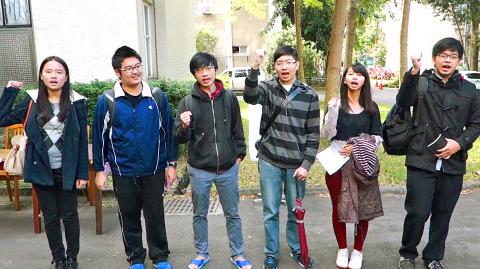Students who participated in a so-called “expert consultation meeting” yesterday to review issues surrounding controversial history curriculum changes unanimously withdrew from the meeting venue in protest of what they said was the Ministry of Education’s attempt to downplay the controversy.
The meeting, held at the Affiliated Senior High School of National Taiwan Normal University in Taipei, was arranged at the order of the Executive Yuan in compliance with an agreement reached among lawmakers during cross-caucus negotiations in early August in the wake of student-led protests against what they called China-centric history curriculum guidelines.
The meeting was attended by six students, who unanimously withdrew from the scene shortly after proceedings began.

Photo: Wu Po-hsuen, Taipei Times
Chia Nan University of Pharmacy and Science student Yu Teng-chieh (游騰傑) said the ministry delayed publishing the minutes taken during previous meetings to design and review the curriculum guidelines.
The ministry’s reluctance to improve data transparency shows that it is insincere about resolving the controversy surrounding the guidelines and is “waiting for the issue to blow over,” Yu said.
Protesters demanded that the ministry publish a roster of experts it contracted to address issues regarding the history guidelines.
Since the controversy erupted in July, the ministry has only disclosed the names of curriculum guidelines development committee members, who were responsible for compiling the guidelines, while information on academics involved in alterations and approval of guidelines are still unavailable.
In response, the ministry said the experts have reached a consensuses on seven of the 17 controversies surrounding the guidelines.
Draft proposals on how to better adjust and compile history curriculum guidelines and how to improve the review process are to be completed by March next year, the ministry said, adding that a roster of experts enlisted for the consultation meetings would be published shortly.
Democratic Progressive Party Legislator Cheng Li-chun’s (鄭麗君) office director, Yu Yi-jan (游毅然), said the ministry had asked academics on a task force to review curriculum guidelines and the curriculum approval committee whether they would like to be identified and most of them declined.
Yu Yi-jan said that the task force and the committee are held responsible by critics for the controversial guidelines, adding that academics in these two units probably did not want to be identified out of concern that it would provoke reproach.
Cheng, sitting on the legislature’s Education and Culture Committee, has criticized the consultation meeting and said that it contravenes the Executive Yuan order.
As all resolutions made during expert consultation meetings must be forwarded to the approval committee, which has the right to decide whether to defer, the arrangement of such meetings does not help to improve an opaque decisionmaking process at all, she said.

Chinese Nationalist Party (KMT) Chairman Eric Chu (朱立倫), spokeswoman Yang Chih-yu (楊智伃) and Legislator Hsieh Lung-chieh (謝龍介) would be summoned by police for questioning for leading an illegal assembly on Thursday evening last week, Minister of the Interior Liu Shyh-fang (劉世芳) said today. The three KMT officials led an assembly outside the Taipei City Prosecutors’ Office, a restricted area where public assembly is not allowed, protesting the questioning of several KMT staff and searches of KMT headquarters and offices in a recall petition forgery case. Chu, Yang and Hsieh are all suspected of contravening the Assembly and Parade Act (集會遊行法) by holding

PRAISE: Japanese visitor Takashi Kubota said the Taiwanese temple architecture images showcased in the AI Art Gallery were the most impressive displays he saw Taiwan does not have an official pavilion at the World Expo in Osaka, Japan, because of its diplomatic predicament, but the government-backed Tech World pavilion is drawing interest with its unique recreations of works by Taiwanese artists. The pavilion features an artificial intelligence (AI)-based art gallery showcasing works of famous Taiwanese artists from the Japanese colonial period using innovative technologies. Among its main simulated displays are Eastern gouache paintings by Chen Chin (陳進), Lin Yu-shan (林玉山) and Kuo Hsueh-hu (郭雪湖), who were the three young Taiwanese painters selected for the East Asian Painting exhibition in 1927. Gouache is a water-based

Taiwan would welcome the return of Honduras as a diplomatic ally if its next president decides to make such a move, Minister of Foreign Affairs Lin Chia-lung (林佳龍) said yesterday. “Of course, we would welcome Honduras if they want to restore diplomatic ties with Taiwan after their elections,” Lin said at a meeting of the legislature’s Foreign Affairs and National Defense Committee, when asked to comment on statements made by two of the three Honduran presidential candidates during the presidential campaign in the Central American country. Taiwan is paying close attention to the region as a whole in the wake of a

OFF-TARGET: More than 30,000 participants were expected to take part in the Games next month, but only 6,550 foreign and 19,400 Taiwanese athletes have registered Taipei city councilors yesterday blasted the organizers of next month’s World Masters Games over sudden timetable and venue changes, which they said have caused thousands of participants to back out of the international sporting event, among other organizational issues. They also cited visa delays and political interference by China as reasons many foreign athletes are requesting refunds for the event, to be held from May 17 to 30. Jointly organized by the Taipei and New Taipei City governments, the games have been rocked by numerous controversies since preparations began in 2020. Taipei City Councilor Lin Yen-feng (林延鳳) said yesterday that new measures by